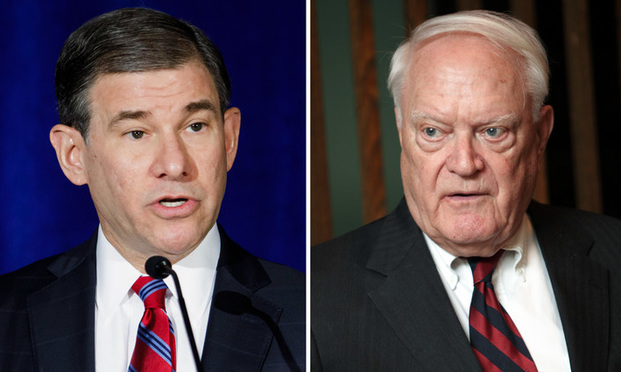Split 11th Circuit Panel Says Insurer on Hook for $1.7M Stolen in Phishing Scam
The majority opinion by Judge William Pryor said Atlanta IT staffing firm Principle Solutions was covered for $1.7 million swiped by scammers, but Judge Gerald Tjoflat said causation was too remote for summary judgment.
December 10, 2019 at 04:22 PM
6 minute read
 U.S. Court of Appeals for the Eleventh Circuit Judges William Pryor and Gerald Tjoflat.
U.S. Court of Appeals for the Eleventh Circuit Judges William Pryor and Gerald Tjoflat.
An insurer remains on the hook for more than $1.7 million stolen from a company in a sophisticated phishing scam that involved a scammer posing as a London attorney, a split federal appeals court panel ruled Monday.
But only Judge William Pryor of the U.S. Court of Appeals for the Eleventh Circuit and visiting jurist Ronald Gilman agreed with the lower court that the commercial crime policy issued to the policyholder, Atlanta IT staffing and consulting firm Principle Solutions Group, "unambiguously" covered the loss.
Judge Gerald Tjoflat felt otherwise, writing that Principle's policy with Ironshore Indemnity stipulated that a covered loss must result "directly" from a fraudulent act.
In Principle's case, several things happened between the time a company officer received a bogus email, including a query by the Wells Fargo fraud prevention unit questioning whether the transfer was legitimate, and the transfer of the money.
Because of that, the question of proximate cause should be a matter for a jury to decide, wrote Tjoflat.
"Given the suspicious nature of the entire transaction, the intervention of the Wells Fargo Fraud Prevention Department was arguably enough to stop Principle's loss," wrote Tjoflat.
Under the majority's analysis, an insurer would always be liable "no matter how much notice the insured had that a scheme could be fraudulent, so long as the insured's actions could, in some way, be traced to an initial fraudulent instruction," he said.
Principle is represented by Barnes & Thornburg partners Scott Godes and James Leonard.
In an email, Godes welcomed the ruling.
"We believe that the decision was correct and look forward to bringing this long-running litigation to a close for the insured," he said.
Ironshore's lawyers, Philip Savrin and William Beuchner Jr. of Freeman Mathis & Gary, did not respond to a request for comment.
As detailed in the opinion and court filings, the fraud began with a 2015 email to Principle's controller, Loann Lien, purporting to be from one of the company's managing directors, Josh Nazarian.
The message said Principle was about to make a "key acquisition" and that she was to wire the money "as soon as possible."
The email instructed Lien to await instructions for the wire transfer from someone posing as attorney Mark Leach with the London firm Bird & Bird. Leach is an actual partner with Bird & Bird and co-heads the firm's technology transactions and international outsourcing practice groups, according to its website.
Lien was instructed to treat the matter "with the utmost discretion," and give Leach her "full attention." Lien responded that she would do so.
Five minutes later an email arrived from the fake Leach. Lien confirmed she could wire the money and the person posing as Leach provided the details to wire it to a Chinese bank. That person called shortly thereafter and "emphasized that they needed to complete the wire transaction that day and that he had Mr. Nazarian's full approval to execute the wire transfer."
Lien and another Principle employee put the transfer together. When Wells Fargo asked for confirmation, she contacted the phony Leach by phone, and was assured Nazarian had approved it.
She relayed that information to Wells Fargo, which released its hold on the funds. More than $1.7 million was wired to a Chinese bank about two hours after the first email.
It was only the next day that Lien discovered the fraud, when Nazarian told her he had not been in the office the day before and knew nothing of the purported deal.
"Nazarian promptly called Wells Fargo to report the fraud, but neither Principle nor law enforcement could recover the funds," the opinion said.
Principle asked Ironshore to make up the loss but the insurer denied coverage, stating that its policy covered losses "resulting directly from a fraudulent instruction directing a financial institution to debit [Principle's] transfer account and transfer, pay or deliver money or securities from that account."
In Principle's case, the bogus email Lien received just instructed her to await instructions, Ironshore said. It also argued that the loss did not directly result from the fraudulent instructions as the scammers "conveyed necessary details to Lien after the initial email and Wells Fargo held the transaction, both of which were intervening events between the instruction and the loss."
Principle filed a complaint asserting claims for breach of contract and bad faith in Fulton Superior Court, which was removed to Georgia's Northern District Court.
Principle filed for summary judgment, and in 2016 Judge Richard Story agreed with Ironshore that the language of the provision was ambiguous. But he said that Georgia case law provides that, if an insurance policy's language is ambiguous, it must be construed in favor of the policyholder, and that Principle was covered.
But he also granted Ironshore's motion for summary judgment dismissing the bad-faith claim, writing that the "issue of liability was close in this case. It was not 'unreasonable' or 'unfounded' for defendant to deny coverage here and wait for this court to determine the coverage required by the contract."
That ruling was not part of the appeal.
In upholding Story's ruling on coverage, Pryor's majority opinion said Ironshore's contention that the emails purporting to be from Leach and Nazarian did not meet the policy's definitions for a "fraudulent instruction" were not persuasive.
"Although the policy defines a fraudulent instruction as a singular 'electronic or written instruction,' Georgia adopts the longstanding rule of construction that the 'singular or plural number each includes the other, unless the other is expressly excluded,'" Pryor wrote.
"Viewing the emails together, the sole purpose of Leach's email was to provide details to effectuate an explicit instruction to make a wire transfer," he said. "So the fraudulent instruction from the scammer purporting to be Nazarian unambiguously falls within the coverage provision."
Tjoflat's 15-page dissent lists 11 separate events that occurred between the receipt of the first email and Well Fargo's release of the funds.
"I would hold that the intervention of Wells Fargo Fraud Prevention Department presents a jury question regarding whether the Nazarian email proximately caused Principle's loss," he said. "So long as reasonable minds could differ, it is no longer the 'plain and undisputed' case that a court can decide as a matter of law."
This content has been archived. It is available through our partners, LexisNexis® and Bloomberg Law.
To view this content, please continue to their sites.
Not a Lexis Subscriber?
Subscribe Now
Not a Bloomberg Law Subscriber?
Subscribe Now
NOT FOR REPRINT
© 2025 ALM Global, LLC, All Rights Reserved. Request academic re-use from www.copyright.com. All other uses, submit a request to [email protected]. For more information visit Asset & Logo Licensing.
You Might Like
View All
Insurer Not Required to Cover $29M Wrongful Death Judgment, Appeals Court Rules

Trying to Reason With Hurricane Season: Mediating First Party Property Insurance Claims


'I Thank You': Attorney Leverages Daily Report Article to Turn $42K Offer Into $600K Settlement
7 minute readLaw Firms Mentioned
Trending Stories
- 1Blank Rome Adds Life Sciences Trio From Reed Smith
- 2Divided State Supreme Court Clears the Way for Child Sexual Abuse Cases Against Church, Schools
- 3From Hospital Bed to Legal Insights: Lessons in Life, Law, and Lawyering
- 4‘Diminishing Returns’: Is the Superstar Supreme Court Lawyer Overvalued?
- 5LinkedIn Accused of Sharing LinkedIn Learning Video Data With Meta
Who Got The Work
J. Brugh Lower of Gibbons has entered an appearance for industrial equipment supplier Devco Corporation in a pending trademark infringement lawsuit. The suit, accusing the defendant of selling knock-off Graco products, was filed Dec. 18 in New Jersey District Court by Rivkin Radler on behalf of Graco Inc. and Graco Minnesota. The case, assigned to U.S. District Judge Zahid N. Quraishi, is 3:24-cv-11294, Graco Inc. et al v. Devco Corporation.
Who Got The Work
Rebecca Maller-Stein and Kent A. Yalowitz of Arnold & Porter Kaye Scholer have entered their appearances for Hanaco Venture Capital and its executives, Lior Prosor and David Frankel, in a pending securities lawsuit. The action, filed on Dec. 24 in New York Southern District Court by Zell, Aron & Co. on behalf of Goldeneye Advisors, accuses the defendants of negligently and fraudulently managing the plaintiff's $1 million investment. The case, assigned to U.S. District Judge Vernon S. Broderick, is 1:24-cv-09918, Goldeneye Advisors, LLC v. Hanaco Venture Capital, Ltd. et al.
Who Got The Work
Attorneys from A&O Shearman has stepped in as defense counsel for Toronto-Dominion Bank and other defendants in a pending securities class action. The suit, filed Dec. 11 in New York Southern District Court by Bleichmar Fonti & Auld, accuses the defendants of concealing the bank's 'pervasive' deficiencies in regards to its compliance with the Bank Secrecy Act and the quality of its anti-money laundering controls. The case, assigned to U.S. District Judge Arun Subramanian, is 1:24-cv-09445, Gonzalez v. The Toronto-Dominion Bank et al.
Who Got The Work
Crown Castle International, a Pennsylvania company providing shared communications infrastructure, has turned to Luke D. Wolf of Gordon Rees Scully Mansukhani to fend off a pending breach-of-contract lawsuit. The court action, filed Nov. 25 in Michigan Eastern District Court by Hooper Hathaway PC on behalf of The Town Residences LLC, accuses Crown Castle of failing to transfer approximately $30,000 in utility payments from T-Mobile in breach of a roof-top lease and assignment agreement. The case, assigned to U.S. District Judge Susan K. Declercq, is 2:24-cv-13131, The Town Residences LLC v. T-Mobile US, Inc. et al.
Who Got The Work
Wilfred P. Coronato and Daniel M. Schwartz of McCarter & English have stepped in as defense counsel to Electrolux Home Products Inc. in a pending product liability lawsuit. The court action, filed Nov. 26 in New York Eastern District Court by Poulos Lopiccolo PC and Nagel Rice LLP on behalf of David Stern, alleges that the defendant's refrigerators’ drawers and shelving repeatedly break and fall apart within months after purchase. The case, assigned to U.S. District Judge Joan M. Azrack, is 2:24-cv-08204, Stern v. Electrolux Home Products, Inc.
Featured Firms
Law Offices of Gary Martin Hays & Associates, P.C.
(470) 294-1674
Law Offices of Mark E. Salomone
(857) 444-6468
Smith & Hassler
(713) 739-1250






